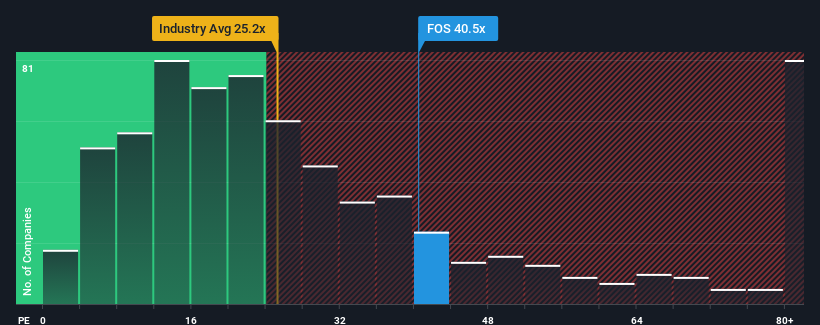- Australia
- /
- Electrical
- /
- ASX:FOS
Optimistic Investors Push FOS Capital Limited (ASX:FOS) Shares Up 33% But Growth Is Lacking
FOS Capital Limited (ASX:FOS) shareholders would be excited to see that the share price has had a great month, posting a 33% gain and recovering from prior weakness. Looking back a bit further, it's encouraging to see the stock is up 26% in the last year.
Following the firm bounce in price, given close to half the companies in Australia have price-to-earnings ratios (or "P/E's") below 19x, you may consider FOS Capital as a stock to avoid entirely with its 40.5x P/E ratio. Although, it's not wise to just take the P/E at face value as there may be an explanation why it's so lofty.
As an illustration, earnings have deteriorated at FOS Capital over the last year, which is not ideal at all. It might be that many expect the company to still outplay most other companies over the coming period, which has kept the P/E from collapsing. You'd really hope so, otherwise you're paying a pretty hefty price for no particular reason.
Check out our latest analysis for FOS Capital

Is There Enough Growth For FOS Capital?
There's an inherent assumption that a company should far outperform the market for P/E ratios like FOS Capital's to be considered reasonable.
Retrospectively, the last year delivered a frustrating 39% decrease to the company's bottom line. The last three years don't look nice either as the company has shrunk EPS by 79% in aggregate. Therefore, it's fair to say the earnings growth recently has been undesirable for the company.
In contrast to the company, the rest of the market is expected to grow by 28% over the next year, which really puts the company's recent medium-term earnings decline into perspective.
With this information, we find it concerning that FOS Capital is trading at a P/E higher than the market. Apparently many investors in the company are way more bullish than recent times would indicate and aren't willing to let go of their stock at any price. There's a very good chance existing shareholders are setting themselves up for future disappointment if the P/E falls to levels more in line with the recent negative growth rates.
What We Can Learn From FOS Capital's P/E?
The strong share price surge has got FOS Capital's P/E rushing to great heights as well. Using the price-to-earnings ratio alone to determine if you should sell your stock isn't sensible, however it can be a practical guide to the company's future prospects.
Our examination of FOS Capital revealed its shrinking earnings over the medium-term aren't impacting its high P/E anywhere near as much as we would have predicted, given the market is set to grow. Right now we are increasingly uncomfortable with the high P/E as this earnings performance is highly unlikely to support such positive sentiment for long. If recent medium-term earnings trends continue, it will place shareholders' investments at significant risk and potential investors in danger of paying an excessive premium.
Before you settle on your opinion, we've discovered 4 warning signs for FOS Capital (2 don't sit too well with us!) that you should be aware of.
You might be able to find a better investment than FOS Capital. If you want a selection of possible candidates, check out this free list of interesting companies that trade on a low P/E (but have proven they can grow earnings).
New: AI Stock Screener & Alerts
Our new AI Stock Screener scans the market every day to uncover opportunities.
• Dividend Powerhouses (3%+ Yield)
• Undervalued Small Caps with Insider Buying
• High growth Tech and AI Companies
Or build your own from over 50 metrics.
Have feedback on this article? Concerned about the content? Get in touch with us directly. Alternatively, email editorial-team (at) simplywallst.com.
This article by Simply Wall St is general in nature. We provide commentary based on historical data and analyst forecasts only using an unbiased methodology and our articles are not intended to be financial advice. It does not constitute a recommendation to buy or sell any stock, and does not take account of your objectives, or your financial situation. We aim to bring you long-term focused analysis driven by fundamental data. Note that our analysis may not factor in the latest price-sensitive company announcements or qualitative material. Simply Wall St has no position in any stocks mentioned.
About ASX:FOS
FOS Capital
Through its subsidiaries, manufactures and distributes commercial luminaires, outdoor fittings, linear extruded lighting, and architectural lighting solutions in Australia and New Zealand.
Solid track record with excellent balance sheet.
Market Insights
Community Narratives



